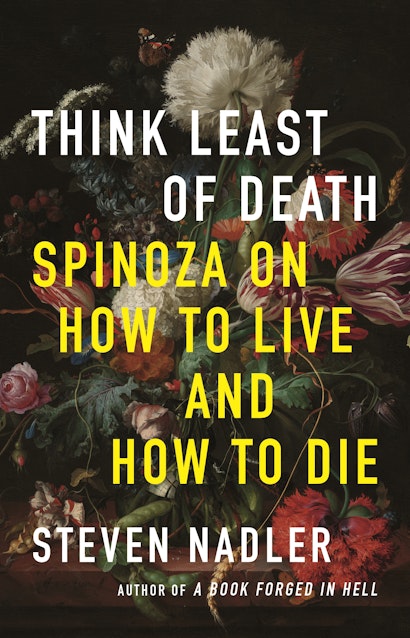How should we face our mortality? Whether death is—as we all hope—a far off eventuality or, through age or illness, imminent, what is the proper attitude to take? Should we fear death? The ancient Epicureans felt that this was something of a category mistake: you should fear only those things that can harm you, and if you are dead then nothing can harm you. As Epicurus so elegantly put it, “Death, the most awful of evils, is nothing to us, seeing that, when we are, death is not come, and when death is come, we are not.”
But if not fear, then should the prospect of one’s own demise at least be a source of anxiety? dread? regret? Or, as some religiously minded people might insist, should the end of this life be looked upon with hope, in the expectation that something better awaits in a world-to-come?
Spinoza’s views in moral philosophy—what he has to say about virtue, the good life, and happiness—were clearly influenced by the wisdom of the ancient Stoics. He was well read in Seneca, Epictetus and others. However, on the topic of death, Spinoza goes his own separate way; in fact, he heads in the completely opposite direction.
The Stoic sage meditates upon death constantly. Epictetus advised, as part of his therapeutic strategy for peace of mind, that one should “keep before your eyes day by day death and exile, and everything that seems terrible, but most of all death.” Seneca, too, recommends thinking often about one’s own mortality as essential to overcoming both fear of one’s own death and grief at the death of others. “Rehearse this thought [about death, that it is the evil that puts an end to all evils] every day, that you may be able to depart from life contentedly. For many men clutch and cling to life, even as those who are carried down a rushing stream clutch and cling to briars and sharp rocks.”
By contrast, Spinoza’s “free person”—the ideal individual all of whose thoughts and actions are under the guidance of reason, not passion—rarely, if ever, thinks about death. In one of the more striking propositions of his philosophical masterpiece, the Ethics, Spinoza notes that “the free person thinks least of all of death.” This is because the free person knows that there is nothing to think about. They understand that there is no afterlife, no post-mortem realm of reward and punishment, no world-to-come. When a person dies, there is, for that person, nothing. In this respect, Spinoza’s view is closer to that of Epicurus.
For Spinoza, there is no immortal soul or self that persists beyond this life. When you are dead, you are dead. The denial of immortality seems, in fact, to have been a constant in Spinoza’s thinking, going back even to around the time of his herem or excommunication from the Amsterdam Portuguese-Jewish community at the age of 23, when he was reportedly telling people that among the reasons for his expulsion from the Sephardic community was his proclaiming that “the soul dies with the body.” But if there is no such thing as immortality, then there is nothing to be afraid of after death—nor, for that matter, anything to hope for. This ancient lesson is something that the free person understands well.
What the free person does think about, constantly, is the joy of living. This does not mean that s/he is obsessed with carnal pleasures and the hedonistic delights that come through sense experience. While Spinoza’s “sage” does not go to the other extreme and lead an austere life of deprivation, s/he does know that the mundane pleasures of food, companionship and art that make life interesting and pleasant are to be pursued only in moderation. The true joy of living, however, comes from the increase in the human “power of striving” that accompanies the acquisition of knowledge, especially knowledge of oneself and of one’s place in nature. This self-understanding is a kind of wisdom, and it fills the free person with self-esteem—not, however, the self-esteem or pride that depends on the opinion of others, but the true estimation of one’s achievement and self-worth. It also liberates the free person from such harmful emotions as hate, envy, and jealousy, and moves him/her to improve the lives of others and treat them with benevolence. In all of this, the free person sees how such attitudes and behaviors are in their own best interest.
I am often asked why, of all the great, dead philosophers, I spend so much time studying and writing about Spinoza. It is because, as I see it, Spinoza basically got it right: about human nature, religion, reason, politics and a good life. He, more than any of the other philosophers I enjoy working on, really is still relevant in the twenty-first century—especially in this era in which science is all too often denigrated and the life of the mind undervalued. For lessons on how to live well, how to lead an examined life, a life that reaches our highest potential as rational being—and, just as important, lessons on how to die—there can be no better guide.
Steven Nadler is the author of many books, including Rembrandt’s Jews, which was a finalist for the Pulitzer Prize, Spinoza: A Life, which won the Koret Jewish Book Award, and A Book Forged in Hell: Spinoza’s Scandalous Treatise and the Birth of the Secular Age (Princeton). He is the William H. Hay II Professor of Philosophy and Evjue-Bascom Professor in the Humanities at the University of Wisconsin–Madison.

